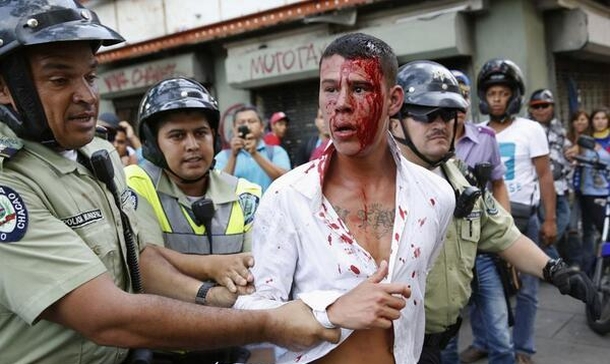Venezuela’s capital city of Caracas has reportedly overtaken Honduras’ San Pedro Sula to become the most violent city in the world, marking a shifting dynamic in homicide rates in Latin America’s urban centers.
The year 2014 saw the city of Caracas hold the title of most violent city in the world, according to the annual ranking of the world’s 50 most violent cities published by the Mexican non-governmental organization the Citizen’s Council for Public Security and Criminal Justice (Consejo Ciudadano para la Seguridad Pública y la Justicia Penal – CCSPJP).
Caracas’ homicide rate rose slightly from about 116 per 100,000 people in 2014 to about 120 in 2015 — or 3,946 murders in a city of almost 3.3 million inhabitants. At the same time, in the city of San Pedro Sula in Honduras — which had topped the list consistently from 2011 until last year — the murder rate fell from about 170 in 2014 to 111 in 2015.
The Salvadoran capital San Salvador was third in the ranking (with a murder rate of about 108), while Acapulco, Mexico was fourth (105), and Maturin, Venezuela was fifth (86).
SEE ALSO: Coverage of Homicides
The top 50 ranking included 21 cities in Brazil, eight in Venezuela, five in Mexico, three in Colombia and two in Honduras. El Salvador, Guatemala and Jamaica had one city each. Latin America accounted for 41 out of 50 cities.
Colombian and Mexican cities boasted the biggest reductions in homicides, while San Salvador displayed the largest increase. The capital’s murder rate skyrocketed 77.3 percent from 61.21 per 100,000 in 2014 to 108.54 in 2015.
Also noteworthy are the exits of former Medellín, Colombia, and Ciudad Juárez, Mexico, from the list. Juárez was number one in the world between 2008 and 2010, while Medellín ranked as the world’s most violent city throughout most of the 1990s, when its murder rate surpassed 300 per 100,000.
InSight Crime Analysis
Latin American cities have dominated the world ranking since the CCSPJP started releasing its global murder rate list five years ago. However, the shift in positions over the past year reflect both the deteriorating security situation and the stark improvements displayed by certain countries throughout the region.
The rising murder rate in Caracas — which was at 98.71 in 2011 — appears to be the symptom of nationwide political and economic chaos and sky-high crime, which has reportedly given rise to heavily armed “mega gangs.”
SEE ALSO: Venezuela News and Profiles
Despite worrying statistics, the turmoil faced by the country’s longstanding socialist regime — including recent National Assembly elections in which the opposition won a majority, a shortage of goods, and the imminent risk of hyperinflation — appears to have detracted attention from effectively tackling crime. A recent attempt to fight gang crime in Caracas led to protests and claims of extortion and robbery by security forces.
Although San Salvador has notably risen into the CCSPJP’s top ten for the first time, this is no surprise given the critical violence levels that made El Salvador the most violent country on the planet last year. The breakdown of a 2012 gang truce has since caused the national murder rate — estimated to be 104.2 per 100,000 — to reach its highest level since El Salvador’s bloody civil war ended in 1992.
SEE ALSO: El Salvador News and Profiles
Former murder capitals Juárez and Medellín are now reportedly safer that the US cities of Baltimore, St. Louis, Detroit and New Orleans, which appear in the CCSPJP’s top 50. Medellín’s turnaround forms part of a broader trend of declining violence in Colombia in recent years. Still, the city’s exit from the list may have more to do with developments in the criminal underworld than with any government policy, given the 2013 truce between criminal organizations Oficina de Envigado and the Urabeños.
In Juárez, too, the fall in crime may be more attributable to the end of a vicious turf war between the Sinaloa Cartel and the Juárez Cartel, rather than government policy.

